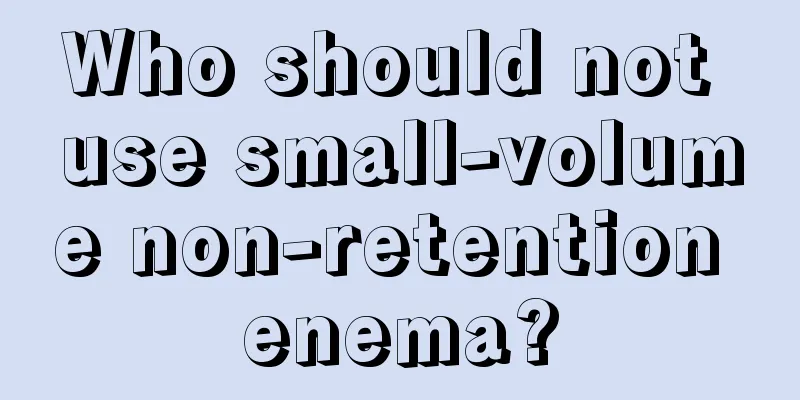Who should not use small-volume non-retention enema?

|
Small-volume non-retention enema is a common technique nowadays. This technique can perform enema work under the best conditions. Its main purpose is to promote defecation and speed up the recovery of qi and blood in the human body. However, everyone should note that enema is not allowed for patients with acute abdomen and gastrointestinal bleeding. You should also take good care of your body in this aspect in normal times and try your best to get rid of this problem. Operation Name Enema - Small volume non-retention enema Indications Small-volume non-retention enemas are often used for the elderly and infirm, pregnant women, children, and after abdominal surgery to promote defecation. Contraindications Enema is not suitable for patients who are pregnant, have acute abdomen, or have gastrointestinal bleeding. Supplies and Preparation Treatment tray: Same as large volume non-retention enema, omit the enema tube, add a funnel or 50ml syringe. Enema solution: Prepare according to the doctor's instructions. Commonly used enema solutions include "1, 2, 3" enema solution (30 ml of 50% magnesium sulfate, 60 ml of glycerol, 90 ml of water) or 60-90 ml of water and glycerol each. Bring a bedpan and screen as well. Take the device to the patient's bedside and explain it to the patient to gain cooperation. Methods and content 1. Patient position: The patient lies on his left side with his left leg straight and his right leg bent forward, his buttocks placed beside the bed, and his anus exposed. 2. Connect the syringe or funnel to the anal canal, pour in or extract the solution, lubricate the front end of the anal canal, remove the air, clamp the anal canal and insert it into the anus, loosen the clamp to allow all the solution to flow in. 3. After the injection, pinch the anal canal and remove it. Instruct the patient to retain stool for 10 minutes before defecation. Precautions 1. If the patient feels the urge to defecate during enema, ask him to take a deep breath. 2. Pay attention to observe the patient's condition during enema. If there is rapid pulse, sweating, pale complexion, palpitations, shortness of breath, or severe abdominal pain, stop immediately and treat the symptoms. |
<<: Will there be complications if I don't retain the purpose of a large amount of enema
>>: What is the purpose of a large non-retention enema? Can constipation be treated
Recommend
What is frequent urination
The main symptom of frequent urination is that yo...
Is epilepsy hereditary? What should patients do?
Epilepsy, also known as epilepsy, has different o...
Tips for removing tooth rust
Some people will have rust on their teeth. There ...
Prostate cancer has these early symptoms! What methods can be used to treat it?
The clinical manifestations of prostate cancer va...
Are there bacteria in the urine that has just been excreted?
As we all know, there may be bacteria in all part...
How to treat corns on feet effectively
Corns on the feet are quite common. If they are s...
What is the cause of edema after unilateral thyroidectomy
Thyroid cancer is a common endocrine tumor in cli...
Hypothermia treatment method
What is hypothermia? What is hypothermia therapy?...
What to do if you have acne on your chest due to excessive liver fire
Many girls or boys will develop pimples on their ...
Other common symptoms of bladder cancer include urinary tract irritation symptoms
The more common manifestations of bladder cancer ...
How long can a person with growth hormone tumor live at most
Disease is a very common phenomenon in people'...
Should the air cushion powder puff be used dry or wet
In recent years, Korean cosmetics have become ver...
Will eating tangerines cause internal heat?
Tangerine is a very common fruit in people's ...
Is it okay to eat bananas on an empty stomach at night?
Banana is a common fruit with very high nutrition...
How to treat thyroid cancer without surgery
Thyroid cancer without surgery usually means that...









